In September 2022, Advance CTE and ECMC Foundation announced the second cohort of The Postsecondary State Career Technical Education (CTE) Leaders Fellowship at Advance CTE—Sponsored by ECMC Foundation. The Advance CTE — ECMCF Fellows include representation across multiple demographic categories reflecting the Fellowship’s goal of intentionally building a postsecondary leadership pipeline for underserved populations in Career Technical Education (CTE) that closes racial representation gaps and removes equity barriers to postsecondary leadership advancement.
This month, we’re excited to highlight two members of Advance CTE’s second cohort of Postsecondary State CTE Leaders Fellows. ECMCF Fellow Danny Sandoval (CO) is already applying the skills he’s acquired in the Fellowship to build his team in meaningful ways.
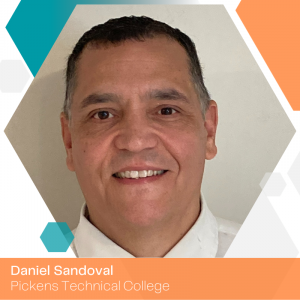 Tell me more about your journey to the Fellowship.
Tell me more about your journey to the Fellowship.
When I first saw the Fellowship advertised, I dismissed it because I wasn’t confident that I was the type of candidate they were looking for. Shortly after, I had a colleague at my institution share it with me, and then I had another colleague who had participated in the first cohort of the Fellowship reach out to try and recruit me. After talking with him, I decided to attend the information session with Dr. Johnson and that was the final nudge I needed to submit my application.
My initial hesitation was due in part to the fact that I didn’t feel like I had enough Career Technical Education (CTE) experience to be considered a good fit for the program. I’d done adjacent work with CTE programs but at that point, I hadn’t worked in CTE, but the Fellowship has allowed me to leverage this experience and it’s been great.
What skills or areas have you experienced the most growth in the program?
I have learned a lot about the operational aspects of CTE, meaning the governance structures, program operation and funding. It’s almost like a conveyor belt humming along under postsecondary that is always moving, so understanding the policies and practices and building a knowledge base of CTE’s significance in the history of our country has been a huge piece for me. Through the Fellowship, I’ve gotten a national perspective of CTE, and how it looks in different states, and I’ve been able to zero in to gain a better understanding of the way programs are organized and interact with industry partners in my own state. This has definitely been an area where I feel like I’ve experienced significant growth over the past year.
Throughout my career, I’ve done a lot of work where I’ve partnered with different industries or different organizations outside of education. It wasn’t until this Fellowship that I made the connection that this work of partnering has been CTE work. Being able to name it and being able to see that my own career journey has also been like a CTE journey has been really reaffirming. Last year, our Pathways Conference in Colorado brought Joel Vargas who was one of the authors of Jobs for the Future’s (JFF) “The Big Blur” report, and his presentation really resonated with me. It is important for people to see that CTE doesn’t have to live in a separate box.
Have you been tapped for new or more advanced roles within your organization as a result of your experience in the Fellowship?
I started a brand new job in the summer of 2020, and it was the first time in my career that I was required to get a CTE license for my role. Taking the steps to maintain my licensure and then continue to elevate my license for professional advancement was a crash course into the world of CTE. This was a brand new position, and the staff didn’t have a plan for what this was going to look like, but I’ve made a lot of connections from hopping into the different professional networks. Fast forward to the present day and I’m now overseeing a team of five people and preparing to hire two more. I went from having almost no budget to being awarded 2.8 million dollars for competitive grants I’ve written. I’m managing multiple grant initiatives and programs and collaborating with external partners to continue to develop additional systems. I’m directly applying the skills and knowledge gained through the Fellowship to execute my vision for my department and even my hiring practices. I’ve been able to see the ways that I can tap the diverse talent in my community. Without the Fellowship, I don’t think I’d have as much clarity around this vision.
When asked about how I’ve managed to acquire these grants, I just say that it comes down to the clear commitment our office has to upskilling and reskilling people of color in our community. We know exactly how to leverage these funds to bring enhanced experiences and opportunities to disadvantaged populations. Marginalized populations can encounter issues – falling flat in leadership roles, or encountering other barriers that keep the momentum from building. The plateau is by design. In order to fight back against that, I have taken the confidence built by the Fellowship and applied these skills to this work. There’s a real purpose driving our implementation and the Fellowship was very instrumental in helping to establish and refine that vision to keep it focused so we aren’t tempted to deviate from it.
How has your experience in the fellowship helped you explore new spaces or positions in postsecondary state CTE leadership?
I feel like the skills I’ve developed through the Fellowship have prepared me for a lot of different roles and expanded my understanding of what type of opportunities would align with my interests.
I’ve been able to attend different conferences in my state and talk with leaders to learn more about their roles in the state CTE landscape. This fellowship has opened doors for me to meet people across the state and beyond and helped me reframe my thinking about what my career trajectory might be. I’ve been able to build up my current role and that momentum excites me. As I continue to build my network by interacting with different folks in state leadership, industry and those working on national initiatives, I feel like the next step will present itself when the time is right.
How has the Fellowship expanded your network?
The Fellowship has expanded my network in a few important ways. I’ve learned a lot from my cohort-mates, attending conferences and hearing from guest speakers during the workshops. I’ve also been able to join Advance CTE’s Kitchen Cabinet on Apprenticeships. This group is advising national policy and it has been a fascinating experience. I’ve been working with my mentor Sonja Wright-McMurray, and I’ve also been able to connect with Dr. Laura Maldonado at Advance CTE. The network is limitless.
You can contact Danny at [email protected].


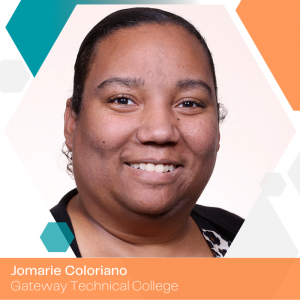 Tell me more about your journey to the Fellowship.
Tell me more about your journey to the Fellowship.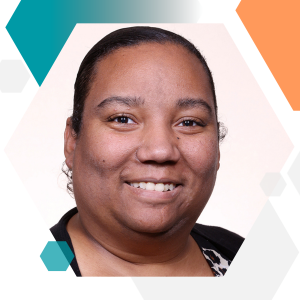


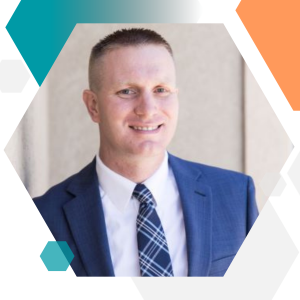
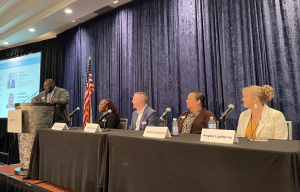 Fellows were also asked to share the key event or events that reinforced their decision to apply to the Fellowship, in other words – when they knew they made the right decision. Dr. Gardner shared that in CTE she rarely has an opportunity to work with or collaborate with other leaders of color across the nation and view the entire landscape of leadership possibilities in postsecondary CTE. The Fellowship offered an opportunity to build a network consisting of her peers, guest speakers invited to the Fellowship workshop and most importantly her coach whom she felt she was perfectly matched with based on their commonalities and interests. She recognized the level of thought the Advance CTE staff dedicated to finding the right mentor for each of the Fellows. Caleb discussed being paired with a postsecondary administrator with an automotive background and how the monthly coaching meetings inspired him to begin seeking the director position he currently holds at his institution.
Fellows were also asked to share the key event or events that reinforced their decision to apply to the Fellowship, in other words – when they knew they made the right decision. Dr. Gardner shared that in CTE she rarely has an opportunity to work with or collaborate with other leaders of color across the nation and view the entire landscape of leadership possibilities in postsecondary CTE. The Fellowship offered an opportunity to build a network consisting of her peers, guest speakers invited to the Fellowship workshop and most importantly her coach whom she felt she was perfectly matched with based on their commonalities and interests. She recognized the level of thought the Advance CTE staff dedicated to finding the right mentor for each of the Fellows. Caleb discussed being paired with a postsecondary administrator with an automotive background and how the monthly coaching meetings inspired him to begin seeking the director position he currently holds at his institution.  Administration of a CTE program with an equity lens begins with ensuring all learners have meaningful access to and substantial engagement in high-quality CTE programming which requires making these actions a priority. Ohio has created and applied equity-minded leadership principles within
Administration of a CTE program with an equity lens begins with ensuring all learners have meaningful access to and substantial engagement in high-quality CTE programming which requires making these actions a priority. Ohio has created and applied equity-minded leadership principles within  The application of equity-minded principles isn’t a one-time occurrence. It requires an ongoing systematic review of policies, practices and data to determine the effectiveness of the mitigating or transformational strategies being applied. Indiana engaged in this process by conducting a review of the CTE equity labs being offered in their state and using additional resources to measure goal attainment and to provide additional supports to local leaders.
The application of equity-minded principles isn’t a one-time occurrence. It requires an ongoing systematic review of policies, practices and data to determine the effectiveness of the mitigating or transformational strategies being applied. Indiana engaged in this process by conducting a review of the CTE equity labs being offered in their state and using additional resources to measure goal attainment and to provide additional supports to local leaders. 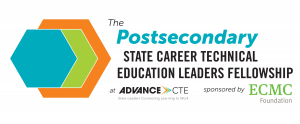
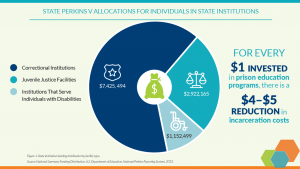
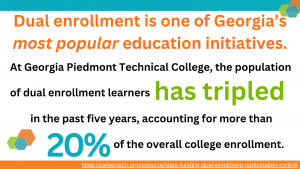
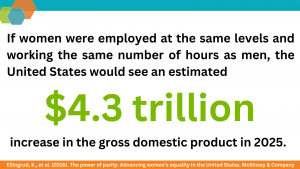
 Pennsylvania
Pennsylvania Texas
Texas Ohio
Ohio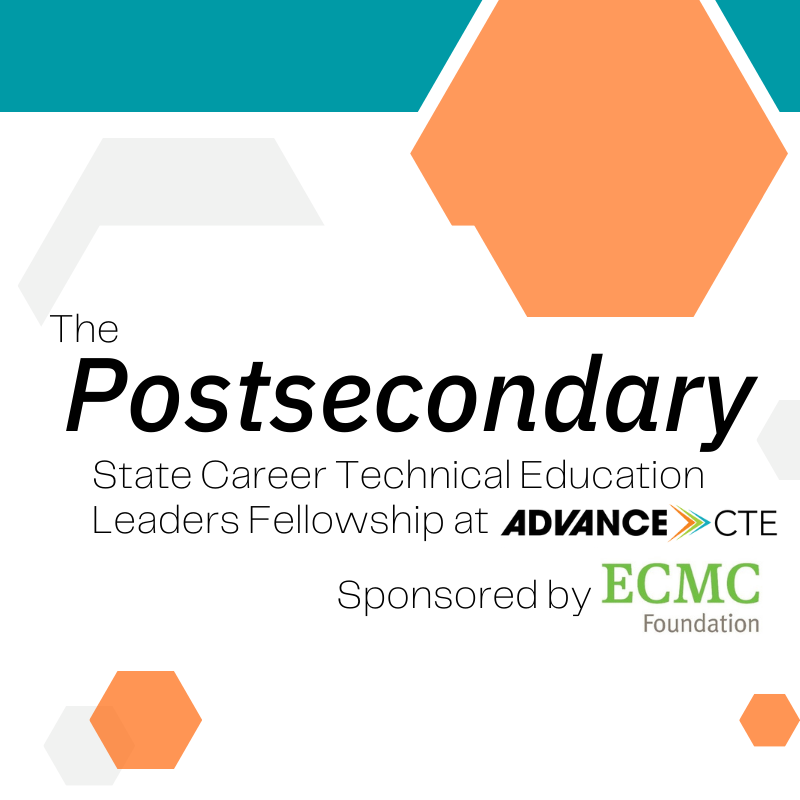 The Postsecondary State CTE Leaders Fellowship at Advance CTE – Sponsored by ECMC Foundation is intended to build a talent pipeline of state-level postsecondary Career Technical Education (CTE) leaders fiercely committed to creating an accessible and racially just postsecondary state CTE system. Through the
The Postsecondary State CTE Leaders Fellowship at Advance CTE – Sponsored by ECMC Foundation is intended to build a talent pipeline of state-level postsecondary Career Technical Education (CTE) leaders fiercely committed to creating an accessible and racially just postsecondary state CTE system. Through the 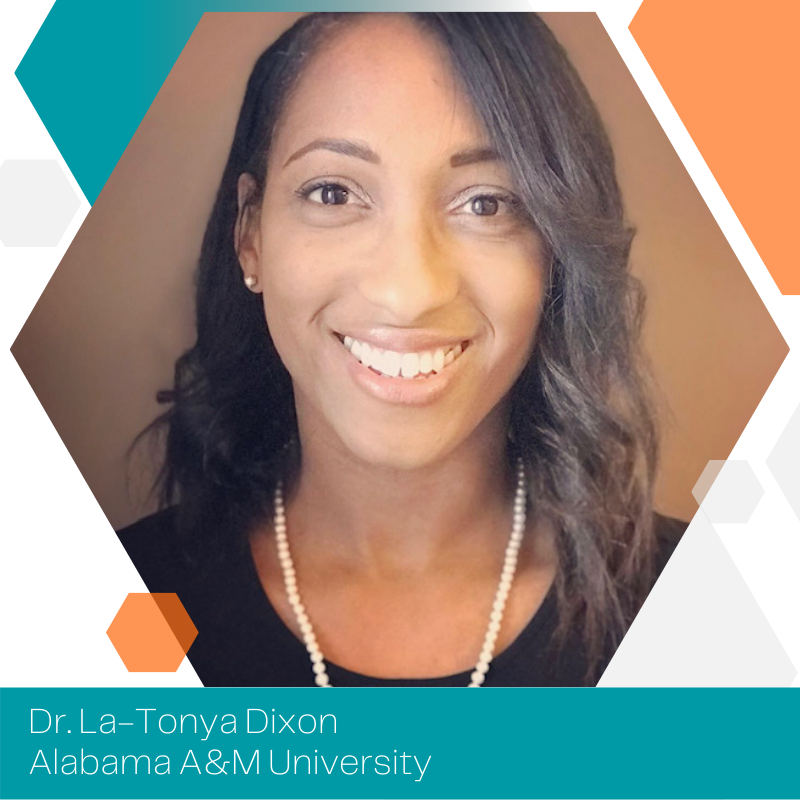
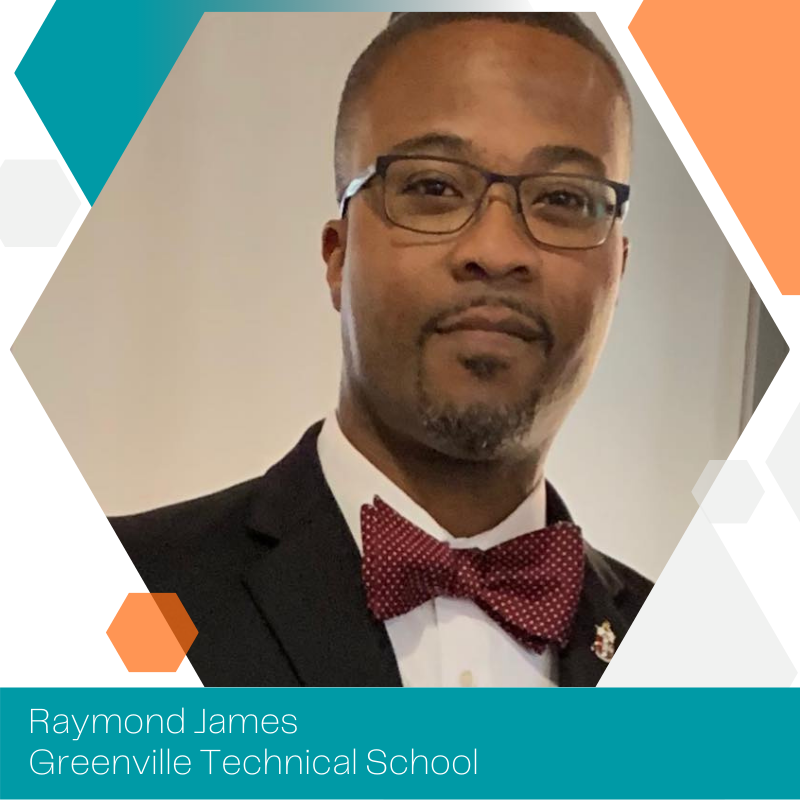 Raymond James (South Carolina) is a veteran of the United States Army, and currently serves as Department Head for machine learning at Greenville Technical School in Greenville, South Carolina. James earned an associate degree in General Engineering Technology at Tri-County Technical College and a bachelor’s degree in Business Administration from Kaplan University.
Raymond James (South Carolina) is a veteran of the United States Army, and currently serves as Department Head for machine learning at Greenville Technical School in Greenville, South Carolina. James earned an associate degree in General Engineering Technology at Tri-County Technical College and a bachelor’s degree in Business Administration from Kaplan University.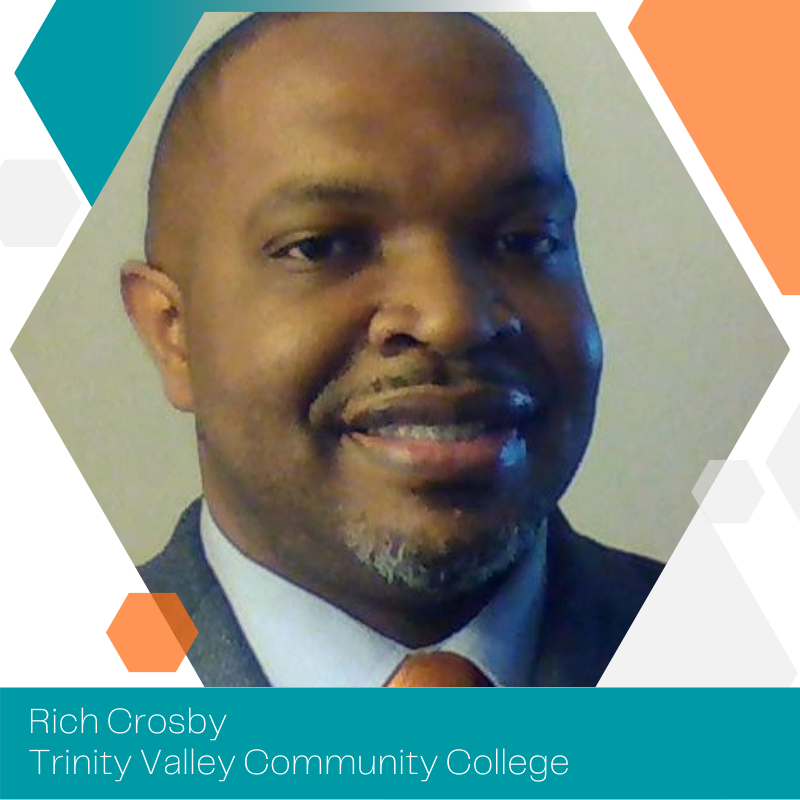
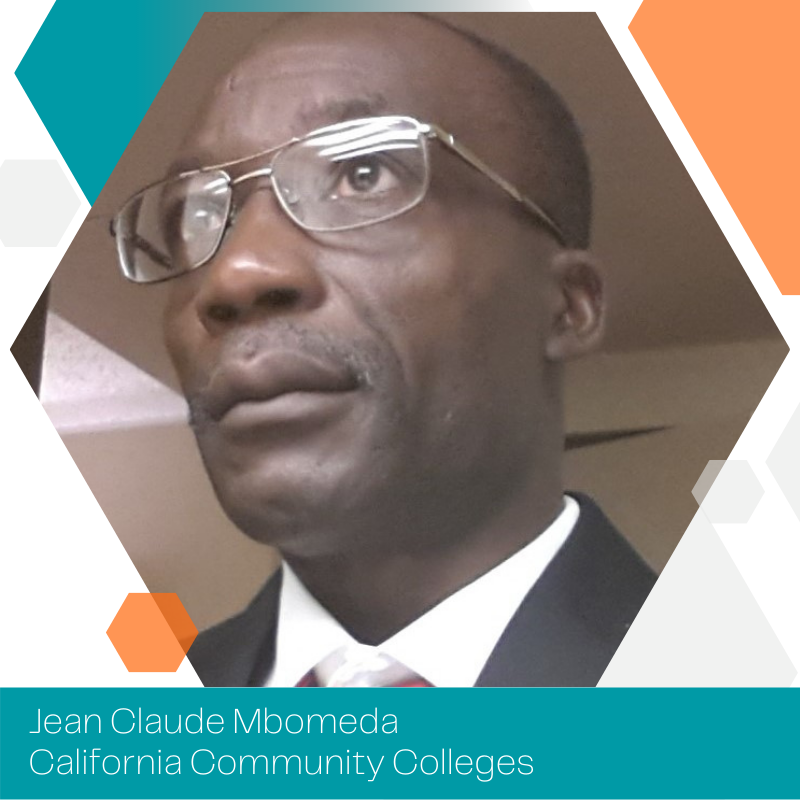
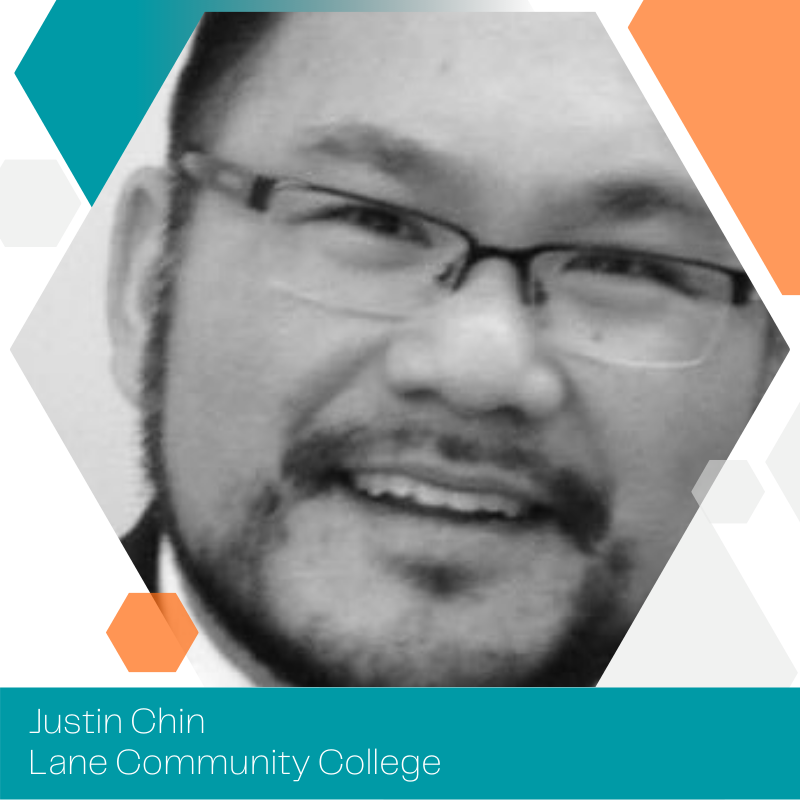 Justin Chin (Oregon) has two decades of experience in education as an instructor and student and career support specialist at the secondary and postsecondary level, and currently serves as Director of High School Connections at Lane Community College in Eugene, Oregon. He received a bachelor’s degree in English and master’s degree in Education from Western Oregon University. He is a current Governor’s appointee to the Eastern Oregon Regional Economic Recovery Council and serves as Vice Chair for Oregon Humanities.
Justin Chin (Oregon) has two decades of experience in education as an instructor and student and career support specialist at the secondary and postsecondary level, and currently serves as Director of High School Connections at Lane Community College in Eugene, Oregon. He received a bachelor’s degree in English and master’s degree in Education from Western Oregon University. He is a current Governor’s appointee to the Eastern Oregon Regional Economic Recovery Council and serves as Vice Chair for Oregon Humanities.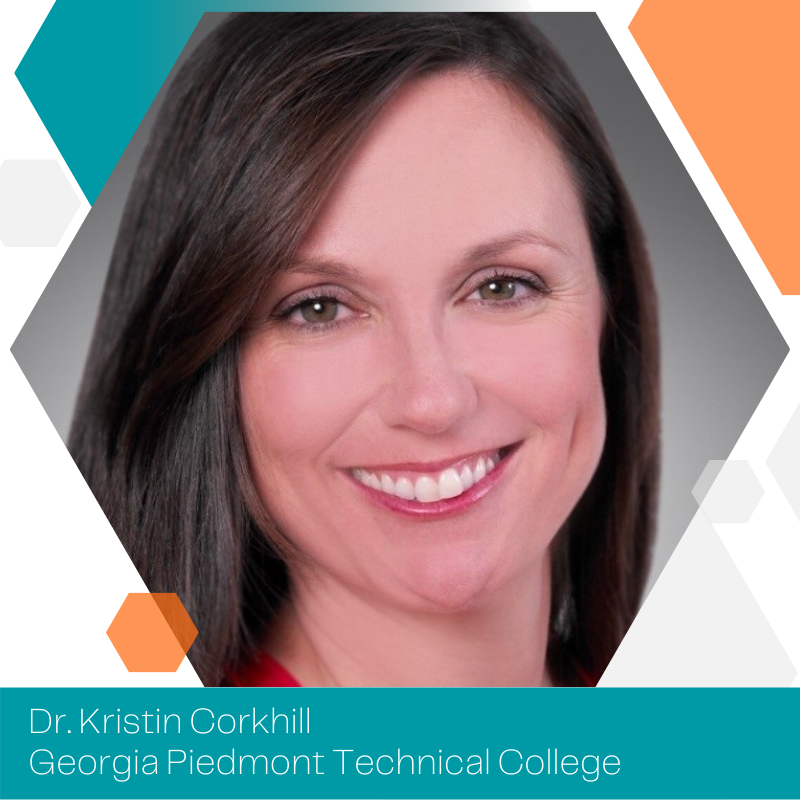 Dr. Kristin Corkhill (Georgia) has over a decade of program support and partnership experience in secondary and postsecondary education, and currently serves as Director of High School Initiatives at Georgia Piedmont Technical College. A dual-enrollment graduate, she earned a bachelor’s and master’s degree in History from the University of Florida and a doctorate in Leadership and Learning in Organizations from Vanderbilt University.
Dr. Kristin Corkhill (Georgia) has over a decade of program support and partnership experience in secondary and postsecondary education, and currently serves as Director of High School Initiatives at Georgia Piedmont Technical College. A dual-enrollment graduate, she earned a bachelor’s and master’s degree in History from the University of Florida and a doctorate in Leadership and Learning in Organizations from Vanderbilt University.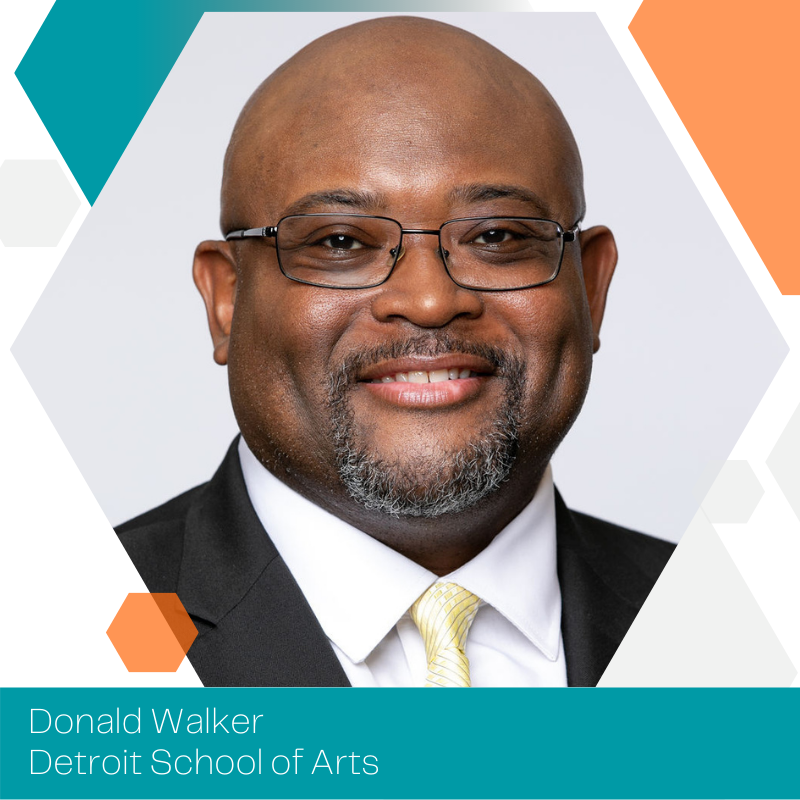 Donald Walker (Michigan)
Donald Walker (Michigan)  Heather Covington (North Carolina) began her CTE journey as a National Board Certified business and marketing instructor and career development coordinator, and currently serves as Assistant Principal at Alston Ridge Middle School in Cary, North Carolina. She is a first-generation graduate with bachelor’s and master’s degrees in Information Technology and Business Education from East Carolina University, an Education specialist degree from Old Dominion University, and two master’s degrees in Instructional Technology and School Administration from North Carolina State University and University of North Carolina, respectively.
Heather Covington (North Carolina) began her CTE journey as a National Board Certified business and marketing instructor and career development coordinator, and currently serves as Assistant Principal at Alston Ridge Middle School in Cary, North Carolina. She is a first-generation graduate with bachelor’s and master’s degrees in Information Technology and Business Education from East Carolina University, an Education specialist degree from Old Dominion University, and two master’s degrees in Instructional Technology and School Administration from North Carolina State University and University of North Carolina, respectively. 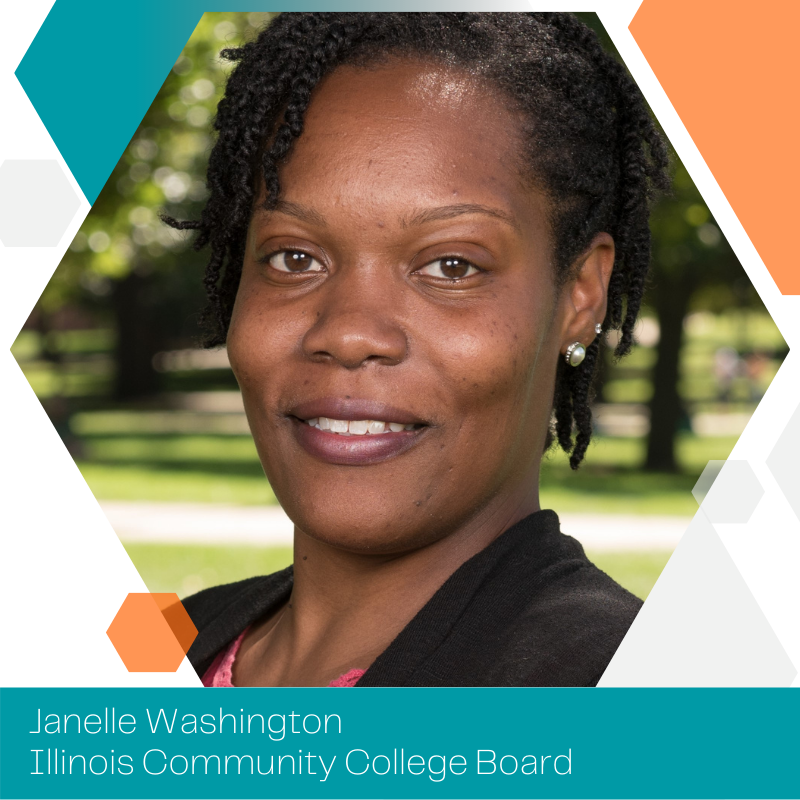 Janelle Washington (Illinois) previously held multiple positions in the criminal justice system prior to pursuing a career in higher education, and currently serves as a Director for Career and Technical Education at the Illinois Community College Board. She earned her bachelor’s degree in Criminal Justice from Southern Illinois University at Edwardsville and master’s degrees in Public Administration and College Student Personnel Administration from University of Illinois Springfield and Illinois State University, respectively.
Janelle Washington (Illinois) previously held multiple positions in the criminal justice system prior to pursuing a career in higher education, and currently serves as a Director for Career and Technical Education at the Illinois Community College Board. She earned her bachelor’s degree in Criminal Justice from Southern Illinois University at Edwardsville and master’s degrees in Public Administration and College Student Personnel Administration from University of Illinois Springfield and Illinois State University, respectively.